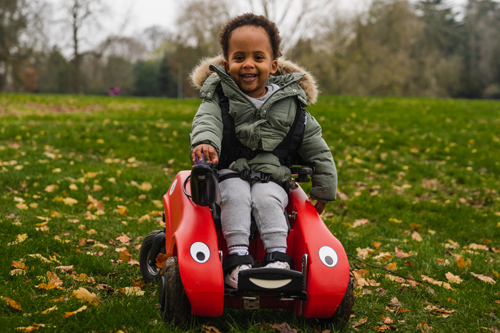Designability
A wheelchair loan scheme for disabled children under five
There are an estimated 30,000 disabled children in the UK living with conditions such as cerebral palsy, spina bifida and muscular dystrophy, which affect their ability to walk.
While research has shown that access to powered mobility in a child’s early formative years is crucial to their development, the NHS does not often fund powered mobility for one to five-year-old children.
 Designability provides powered wheelchairs called Wizzybugs to young, disabled children under five. When a child outgrows the chair, it is returned to the charity for refurbishment so that each chair can help more children.
Designability provides powered wheelchairs called Wizzybugs to young, disabled children under five. When a child outgrows the chair, it is returned to the charity for refurbishment so that each chair can help more children.
The chairs are provided free of charge through the Wizzybug Loan Scheme. The charity has also established an access fund which provides financial support to cover petrol and travel expenses for families to attend their Wizzybug handover. In the past year, it has also been able to remove the £200 security deposit that families previously needed to pay.
The scheme secured initial funding from the Starfish Trust to enable it to start loaning out the Wizzybugs to families in the southwest of England. Since then it has secured further funding and the scheme is now available throughout the UK.
In the last year, 140 children were using a Wizzybug and the scheme has supported over 1,000 children in total.
To measure the impact of the programme, the charity uses the Canadian Occupational Performance Measure (COPM). The child’s performance in mobility-related goals is scored from one to 10 before they receive their Wizzybug, and re-scored after six months of Wizzybug use.
A difference in mean scores of two or higher for each COPM assessment is considered a significant positive change and 80.4% of the families that completed a COPM assessment reached this level.
Chair of the Charity Awards judges Su Sayer said: “The results are good, the children love it, the families love it, and it’s transformative for those children that get one.
“The true number of people that experience a positive impact from the scheme is much higher than 140 because it benefits the child’s immediate family too, and everybody they come into contact with.”
CC Reg no. 256335
